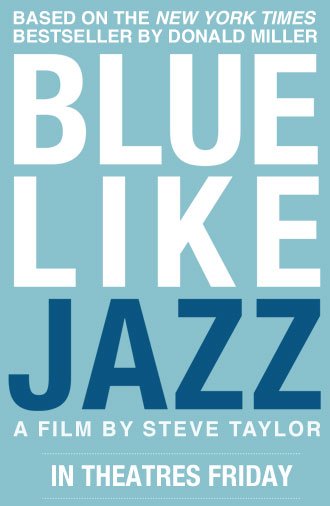“Unchallenged Humanist Bigotry and Empty Faith”

| None | Light | Moderate | Heavy | |
|---|---|---|---|---|
| Language | ||||
| Violence | ||||
| Sex | ||||
| Nudity |
What You Need To Know:
In the end, Don returns to some faith in God and Jesus, but his new faith remains rather vague, without any solid biblical foundation. It’s also politically correct and touched with a vague, but leftist, revisionist, false history against the Christian church and against the United States. Apparently, the motive behind BLUE LIKE JAZZ is to attack the Bride of Jesus Christ, which is the church. The problem is, the politically correct, humanist attacks and mockery against Christianity, religion, the church, and America go virtually unchallenged.
Content:
(PaPaPa, HHH, ABABAB, CC, B, PCPCPC, RHRHRH, APAPAP, ACapACap, HoHo, LL, V, S, N, AA, DD, MM) Very strong, somewhat mixed pagan worldview with very strong, mean, ignorant, and angry humanist attacks on and mockery of Christianity, religion, and the very idea of God that almost always go unchallenged except in a couple scenes (including a comparison of all Christians with the Taliban Muslims and vandalism of a church includes a sign saying, “Don’t let these people reproduce”), some overt Christian content and light defenses of the idea of God that include woman says she likes Jesus, woman’s Episcopal church and its pastor are shown in a positive light despite attacks against them, woman criticizes young man and his friend’s mean vandalism and vicious verbal attack on her church, woman quotes Mother Theresa in a positive light, young man returns to vague faith in God and Jesus after becoming disillusioned and attacking Christianity, religion, and morality, and some light moral elements about helping needy people, plus very strong politically correct and left-wing revisionist history attitude or tone that’s also Anti-American (especially a vague charge against “U.S. foreign policy”), and strong anti-capitalist elements and acceptance of homosexuality and lesbian woman; 22 obscenities (mostly “s” and “h” words), two or three profanities, blasphemy, implied urinating, vomiting, scatological humor, and comments on breast feeding and sexual parts of people’s bodies; light brief violence includes beating on car window and trying to damage car, man comically shoves people off a stage, man burns books; sexual content includes homosexual references, implied adultery with a pregnancy out of wedlock, talk about a priest raping boy in the past, a giant condom balloon placed on church steeple, references to real condoms, implied fornication; upper male nudity, man wears a dress; alcohol use and drunkenness; smoking and marijuana use depicted, including eating marijuana brownies; and, strong miscellaneous immorality includes lying, stealing, revenge, rebellion, dysfunctional family portrayed, father is a pothead and a drinker and lives in a trailer, bad role models, main character vandalizes public property, man dumps cellphone into holy water basin, protagonist is mean and unforgiving to his mother.
More Detail:
Don is from a Bible belt town in Texas. An assistant to the married youth pastor, he discovers his religious mother is having an affair with the man. With help from his atheist father, a professor, he flees to a godless liberal college in Portland, Oregon called Reed College.
There, Don becomes involved with the counter culture. He befriends a lesbian woman. He also befriends an atheist who prances around in a Catholic Pope costume denouncing Christianity and American society. Finally, he befriends Penny, an anti-corporate activist. He gets wrapped up in Penny’s civil disobedience against a corporate bookstore and against a water bottle company that she alleges is exploiting poor people in India. Meanwhile, Don refuses to take calls from his mother.
Penny goes to India during Christmas break to help refugees in the Kashmir area in India. After she returns, Don helps the atheist student place a giant condom balloon on the nearby Episcopalian church’s steeple. They also leave a sign on the church door asking the congregation not to procreate.
Penny is very upset about this, and Don is surprised when Penny reveals that she’s actually a member of that church. She tells him he doesn’t know the people he hurt by his actions.
So, Don spends that winter brooding alone. Then, he makes another angry attack on Penny’s church when he learns his mother is pregnant from his former youth pastor. He dumps a corny Armor of God costume in the middle of a service and dumps his cellphone into the holy water container in the back of the pews. Will Don further alienate Penny, or come to terms with her Christian beliefs?
Although there’s a redemptive ending to BLUE LIKE JAZZ where Don returns to faith, the movie is heavily marred with drinking, drugs, rebellion, and angry attacks on Christianity. At the end of the movie, Don makes a one-sided, unhistorical, false comment about the Crusades. He also vaguely asks one character’s forgiveness for U.S. foreign policy. Does he mean America’s fight against communist tyranny, which resulted in liberty for Eastern Europe? Or, what about America’s fight against vicious Arab and Muslim terrorism and Anti-Semitism against Jews and Israel, not to mention Christians living in the Middle East?
BLUE LIKE JAZZ preaches the message that the church, the Body of Christ, is filled with moral corruption, both now and in the past. It conveniently separates God and Jesus Christ from the church, and never comes to terms with the fact that Penny belongs what appears to be a very good and healthy Episcopalian church.
Throughout the movie, Don doesn’t display any solid theological or historical knowledge. He also doesn’t display any sort of mental questioning, research, or Christian apologetics, or even questions any of the attacks on Christianity and American society from the atheists, pagans, and leftists he encounters at Reed College. In fact, he just openly goes along with all the insane things nearly any Non-Christian or leftist tells him. Of course, that’s exactly the way he seemed to act at his church in Texas – just go along to get along.
Of course, Jesus tells us that the church is the Body of Christ. While it’s true that churches contain sinful members since they are the very people who need savlation, 1 Corinthians 10:32 tells us: “Do not cause anyone to stumble, whether Jews, Greeks or the church of God.” Clearly, the church doesn’t condone adulterous affairs, which are an individual’s own sin, not the church’s. Imperfect is the key to needing the Grace of Jesus, and every Christian and every Christian community must constantly deal with imperfection and sin.
BLUE LIKE JAZZ is slow because it doesn’t have a clear plotline. Its protagonist just meanders like its story, and the movie just shows many scenes of college life. Don gets into the tennis team that drinks cocktails, decides to make a bike, buys some gloves for Penny, and becomes part of her group protesting a corporate bookstore and a water company. All this isn’t very exciting and makes the viewer wonder, Where is this thing going? The acting is very good in the movie, but even this is undermined by the fact that the protagonist becomes a very unlikeable person who’s mean to his wayward mother. Don is also mean to a friend from Texas who comes many miles to visit him at the college.
Overall, BLUE LIKE JAZZ shows a young college boy who wants to get away from Christianity but realizes he still believes in God anyway. The last scenes are more like a phony guilt trip rather than real Christian evangelism, despite Don’s return to some vague, unexplained kind of faith. Also, BLUE LIKE JAZZ accepts so many phony arguments against Christianity that it wouldn’t be surprising if many viewers will be completely turned off of Christianity just from viewing it. Even if they aren’t, they won’t discover any real Christian or biblical theology in the movie beyond Don’s leftist posturing about forgiveness, hypocrisy, the Crusades, and “U.S. foreign policy” (whatever that means)! Ultimately, the minimalist faith expressed by the protagonist at the end of BLUE LIKE JAZZ is a relatively empty faith, with no solid theological content and no biblical standards. It’s also full of left-wing political correctness and unproven revisionist history that smacks of claptrap.
Instead of watching BLUE LIKE JAZZ, moviegoers should read or re-read some books on Christian apologetics, Christian history, and American history. Such books will help them defend their faith, overcome evil with good, defend the United States from leftist utopian tyranny and revisionist history, and stand upon the Truth of Jesus Christ and His Gospel.


 - Content:
- Content: 

